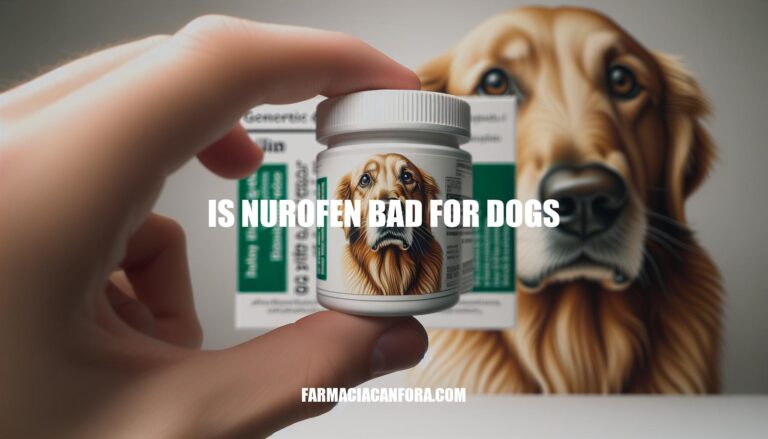Pet owners might wonder, “Is Nurofen bad for dogs?” because it’s a common pain reliever for humans. However, it’s crucial to understand that medications like Nurofen, which contains ibuprofen, can be extremely dangerous for dogs. Knowing the risks associated with giving human medications to pets is essential to prevent serious health issues and ensure their safety.
What is Nurofen?
Nurofen is a brand of pain-relief medication containing ibuprofen, a non-steroidal anti-inflammatory drug (NSAID). Ibuprofen works by blocking the production of prostaglandins, chemicals in the body that cause pain and inflammation.
Common uses in humans:
- Pain relief: Headaches, toothaches, menstrual cramps, muscle aches, and arthritis.
- Inflammation reduction: Conditions like rheumatoid arthritis and osteoarthritis.
- Fever reduction: Commonly used to lower fever.
Mistakenly given to dogs:
- Misunderstanding: Owners might think it’s safe for pets because it’s common for humans.
- Risks: Ibuprofen can cause serious health issues in dogs, including gastrointestinal ulcers, kidney failure, and even death.
Why is Nurofen Bad for Dogs?
Nurofen, which contains ibuprofen, is highly toxic to dogs. Here are the specific reasons and effects:
Toxic Effects of Ibuprofen on Dogs
-
Gastrointestinal Damage:
- Ulcers and Bleeding: Ibuprofen can cause severe irritation and ulceration in the stomach and intestines, leading to vomiting (sometimes with blood), diarrhea, and abdominal pain.
- Loss of Appetite: Dogs may refuse to eat due to stomach discomfort.
-
Kidney Damage:
- Reduced Blood Flow: Ibuprofen inhibits enzymes that help maintain blood flow to the kidneys, leading to potential kidney failure.
- Increased Thirst and Urination: Signs of kidney damage include increased drinking and urination.
-
Liver Damage:
- Toxicity: High doses can cause liver damage, leading to jaundice (yellowing of the skin and eyes), and further vomiting.
-
Neurological Effects:
- Seizures and Coma: In severe cases, ibuprofen toxicity can lead to neurological symptoms such as seizures, tremors, and even coma.
Symptoms of Ibuprofen Poisoning
-
Immediate Symptoms:
- Vomiting and diarrhea
- Lethargy and depression
- Abdominal pain
- Black or tarry stools
- Increased thirst and urination
-
Long-term Symptoms:
- Chronic ulcers
- Persistent kidney and liver damage
- Neurological issues like seizures and ataxia (loss of coordination)
Health Risks
- Gastrointestinal Ulceration: Can lead to severe bleeding and perforation of the stomach or intestines.
- Kidney Failure: Potentially life-threatening, requiring immediate veterinary intervention.
- Liver Failure: Can cause systemic toxicity and long-term health issues.
- Neurological Damage: Severe cases can result in permanent neurological deficits or death.
If you suspect your dog has ingested ibuprofen, seek veterinary care immediately. Quick action is crucial to mitigate these severe health risks.
Symptoms of Nurofen Toxicity in Dogs
Here are the symptoms to watch for if a dog has ingested Nurofen (ibuprofen):
Mild Symptoms:
- Vomiting: Often the first sign, may contain blood.
- Diarrhea: Can also be bloody.
- Abdominal Pain: Your dog may show signs of discomfort or tenderness.
- Decreased Appetite: Reluctance to eat or drink.
- Lethargy: Unusual tiredness or lack of energy.
Severe Symptoms:
- Gastrointestinal Ulceration: Severe stomach pain, dark tarry stools, or bloody stools.
- Kidney Damage: Increased or decreased urination, increased thirst, or signs of dehydration.
- Neurological Issues: Incoordination, tremors, seizures, or coma.
- Pale Gums: Indicating potential internal bleeding.
- Yellowing of Skin and Eyes (Jaundice): Sign of liver damage.
What to Do if Your Dog Ingests Nurofen
- Stay Calm: Keep your dog calm and remove any remaining Nurofen from their reach.
- Gather Information: Note the amount of Nurofen ingested, the strength (mg), and the time of ingestion.
- Contact a Veterinarian Immediately: Call your vet or an emergency veterinary clinic right away. This is crucial.
- Follow Instructions: Follow the vet’s instructions precisely. They may advise you to bring your dog in for immediate treatment.
- Do Not Induce Vomiting: Unless specifically instructed by a vet, do not try to make your dog vomit.
Contacting a veterinarian immediately is essential to ensure your dog’s safety and health.
Preventing Nurofen Ingestion in Dogs
Here are some tips and best practices to prevent accidental ingestion of Nurofen by dogs:
Safe Storage
- Keep Medications Out of Reach: Store all medications, including Nurofen, in high cabinets or locked drawers. Avoid leaving them on countertops, tables, or in bags that dogs can access.
- Original Containers: Always keep medications in their original containers with intact labels. This helps ensure you can quickly identify them and follow the correct usage instructions.
- Secure Locations: Ensure that storage areas are secure and not easily accessible by pets. Remember, some dogs can jump or climb to reach high places.
Handling Medications
- Avoid Mixing: Do not store human medications near pet medications to prevent mix-ups.
- Daily Pill Holders: If you use a daily or weekly pill holder, make sure it is stored out of reach, as dogs might see it as a chew toy.
- Handbags and Purses: Keep handbags that contain medications out of reach of pets.
General Tips
- Educate Family Members: Ensure everyone in the household is aware of the dangers of pets ingesting human medications and follows the same storage and handling practices.
- Emergency Plan: Have the contact information for your veterinarian and the nearest animal poison control center readily available in case of an emergency.
By following these practices, you can help keep your furry friends safe from accidental ingestion of harmful medications like Nurofen.
Nurofen Toxicity in Dogs
Nurofen, which contains ibuprofen, is highly toxic to dogs and can cause severe health issues including gastrointestinal ulcers, kidney failure, and liver damage.
If you suspect your dog has ingested Nurofen, seek veterinary care immediately. It’s essential to store medications safely out of reach of pets and handle them responsibly to prevent accidental ingestion.
Educate family members on the dangers of giving human medications to dogs and have a plan in place for emergency situations.
Always consult with a veterinarian before administering any medication to your dog.


